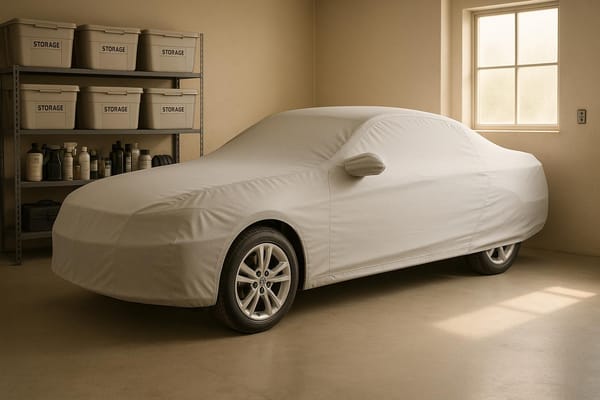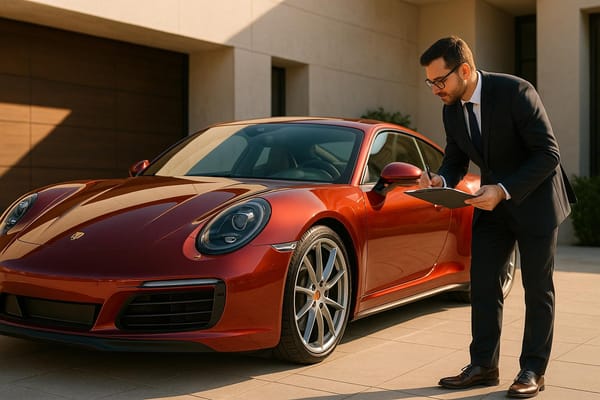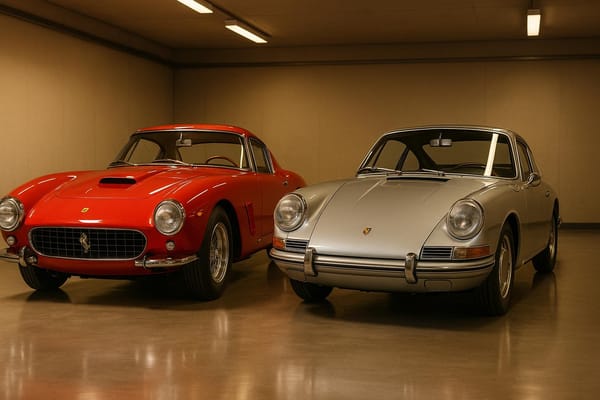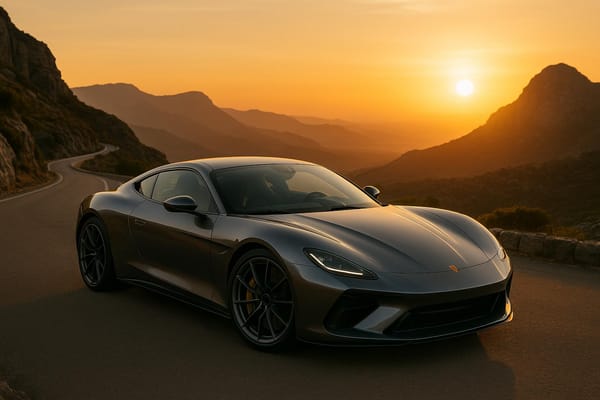How Exotic Car Insurance Differs from Standard Policies
Explore the unique features of exotic car insurance, including agreed value coverage and specialised repairs, compared to standard policies.
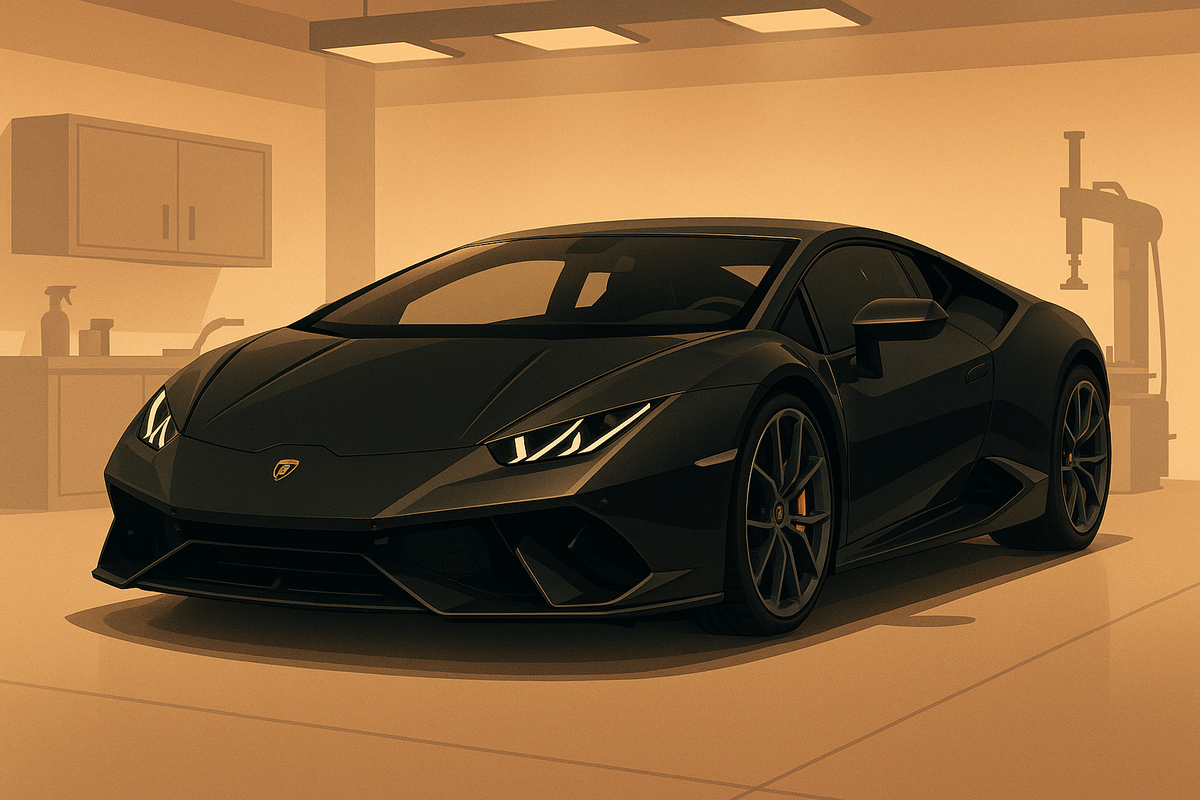
Exotic car insurance is designed to protect high-value, rare vehicles like Ferraris or McLarens. It differs from standard car insurance in several key ways:
- Agreed Value Coverage: Exotic car policies pay the pre-agreed value of the car, unlike standard policies that pay the current market value.
- Specialised Repairs: Repairs use original manufacturer parts to maintain the car's value and performance.
- Track Day Coverage: Optional coverage for driving on circuits like Silverstone.
- Enhanced Security: Insurers may require advanced tracking systems and secure storage.
Quick Comparison Table
| Feature | Exotic Car Insurance | Standard Car Insurance |
|---|---|---|
| Vehicle Valuation | Agreed value | Market value |
| Repair Standards | Original manufacturer parts | Aftermarket parts |
| Track Day Coverage | Optional | Not included |
| Security Requirements | Advanced systems and monitored storage | Basic factory-fitted systems |
| Driver Age | Typically 30+ | From age 17 |
Exotic car insurance is tailored for the unique needs of luxury vehicles, whereas standard insurance is more generalised for everyday cars. While premiums are higher for exotic cars, the coverage ensures your investment is fully protected.
Everything you need to know about Insuring your Supercar ...
1. Exotic Car Insurance Details
This section dives into the specialised features of exotic car insurance, building on the unique risks these vehicles present.
Coverage Specifics
Exotic car insurance comes with several tailored features:
- Agreed Value Coverage: A pre-determined value is set by specialists, ensuring a full payout if the car is deemed a total loss.
- Original Parts Guarantee: Ensures repairs use manufacturer-certified parts to maintain the vehicle's integrity.
- Track Day Coverage: Optional protection for driving on circuits like Silverstone or Brands Hatch.
These features are designed to address the unique needs of high-end vehicles. Costs, however, are influenced by several factors.
Cost Considerations
Premiums are calculated based on factors such as the car's value, storage conditions, annual mileage, and the driver's experience. Secure storage and limited mileage can lower costs, while insurers also prioritise drivers with a proven track record of handling high-performance cars.
Eligibility Requirements
To qualify for exotic car insurance, certain criteria must be met:
- Driver Age: Typically, drivers must be over 30.
- Driving Record: A clean driving history is essential.
- Security Systems: Advanced tracking devices and immobilisers are required.
- Secure Storage: The car must be stored in a monitored, climate-controlled garage.
Meeting these requirements ensures eligibility, but these policies also provide additional features to protect your investment.
Enhanced Policy Features
Exotic car insurance often includes added benefits:
- Flatbed Transport: Coverage for transporting the vehicle to authorised repair centres.
- Multi-car Flexibility: Options to insure multiple exotic cars under one policy.
- Restoration Coverage: Protection during lengthy restoration projects.
- International Coverage: Extended protection for driving across Europe.
These tailored features ensure comprehensive protection, addressing the specific challenges of owning and maintaining an exotic car.
2. Standard Car Insurance Basics
Standard car insurance is designed to cover everyday vehicles, offering straightforward protection compared to the more tailored features of exotic car policies.
Coverage Options
Standard car insurance generally comes with three main levels of coverage:
- Third Party Only (TPO): The minimum legal requirement, covering damage to other vehicles and property.
- Third Party, Fire and Theft (TPFT): Includes TPO coverage plus protection against fire damage and theft.
- Comprehensive: Offers the most extensive coverage, including accidental damage to your own car.
Payouts for standard policies are usually based on the vehicle's market value at the time of the claim.
Factors That Affect Costs
The cost of standard car insurance depends on several factors:
| Factor | Impact on Premium |
|---|---|
| Vehicle Value | Typically ranges from £500–£50,000 |
| Engine Size | Commonly between 1.0L and 3.0L |
| Driver Age | Higher premiums for drivers under 25 |
| Location | Urban areas can increase costs by 20–30% |
| Annual Mileage | Average is around 7,400 miles per year |
Eligibility Criteria
Standard car insurance has relatively simple requirements compared to specialised policies:
- Minimum Age: Usually available from age 17.
- Driving Experience: Provisional licence holders are typically accepted.
- Security: Vehicles should have factory-fitted immobilisers and alarms.
- Storage: Parking on the street or in a driveway is generally acceptable.
Key Features of Standard Policies
Standard car insurance includes several basic features aimed at everyday drivers:
- Repair Network: Access to approved repair centres, often using aftermarket parts.
- Courtesy Car: A basic replacement vehicle provided while repairs are carried out.
- European Cover: Limited to around 30 days of driving abroad.
- Personal Belongings: Coverage for items in the car, usually capped between £100 and £250.
This type of policy is designed to meet the everyday needs of most drivers, offering practical coverage without the complexities of exotic car insurance.
Insurance Comparison: Benefits and Limitations
Exotic and standard car insurance differ significantly in how they value vehicles and calculate premiums. Exotic car insurance typically sets an agreed value when the policy begins, while standard insurance bases claims on the market value at the time of an incident. This key difference often means higher premiums for exotic car policies, reflecting the unique risks involved.
Exotic car insurance also adapts its coverage to suit the specific needs of high-value vehicles. Factors like limited usage and the specialised care required for these cars are taken into account. These tailored adjustments make exotic car insurance distinctly different from the more generalised approach of standard policies.
Conclusion
Exotic car insurance is specifically designed to cover high-value and rare vehicles, addressing risks that standard policies simply can't handle. These policies are crafted to protect the unique value of rare and investment-grade cars.
For collectors who prioritise both rare vehicles and tailored protection, platforms like MARQHAUS offer a specialised way to explore supercars and classic investment-grade vehicles.
Although exotic car insurance comes with higher premiums, it provides comprehensive coverage that protects your investment and offers peace of mind.
FAQs
What factors affect the cost of insuring an exotic car compared to a standard car?
The cost of insuring an exotic car is influenced by several unique factors that set it apart from standard car insurance. These include:
- Vehicle value: Exotic cars are often significantly more expensive, which increases both repair costs and potential payouts for insurers.
- Specialised repairs: High-end vehicles may require rare parts or expert mechanics, leading to higher repair costs.
- Limited availability: Exotic cars are often produced in small numbers, making replacement parts harder to source and more expensive.
- Driving habits: Insurers may consider how often and where the car is driven, as exotic cars are often used less frequently or for special occasions.
In addition, insurers may offer tailored cover for exotic cars, such as agreed value policies or protection for rare, investment-grade vehicles. These bespoke features ensure that your car is adequately protected but can also increase premiums.
Why does exotic car insurance often include agreed value coverage instead of market value coverage?
Exotic car insurance typically includes agreed value coverage because it offers better financial protection for high-value vehicles. With agreed value coverage, you and your insurer agree upfront on the car's value, meaning you'll receive this pre-determined amount if the car is written off or stolen. This is particularly important for exotic cars, as their value can be influenced by factors like rarity, collectability, and market demand.
In contrast, market value coverage only pays out the car's current market value at the time of the claim, which can fluctuate and may not reflect the true worth of an exotic vehicle. Agreed value coverage ensures you’re adequately compensated, protecting your investment in a way standard policies often cannot.
What are the eligibility requirements for exotic car insurance, and how do they differ from standard car insurance?
Exotic car insurance typically has stricter eligibility requirements compared to standard car insurance due to the high value and unique nature of these vehicles. Insurers may require you to prove ownership of a secure garage, demonstrate a clean driving record, or limit the car’s use to occasional driving rather than daily commutes.
Unlike standard policies, exotic car insurance often includes specialised coverage tailored to rare and high-value vehicles, such as agreed value coverage or protection during transportation to events. These policies are designed to reflect the unique risks and needs associated with owning an exotic car.

